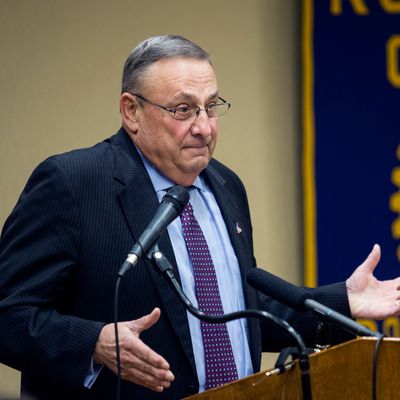
Maine’s relentlessly abrasive conservative Republican governor, Paul LePage, is engaged in an interesting if rather evil political experiment: Can labeling Medicaid as “welfare” sufficiently undermine support for the program to defeat a ballot initiative that would make the state the 31st to accept the Affordable Care Act’s Medicaid expansion?
Having vetoed legislation accepting the Medicaid expansion on five occasions, LePage is now battling a ballot initiative to do what he would not let the legislature do. An expansion would make an additional 70,000 Mainers eligible for Medicaid, at a relatively low cost to the state. But the exact wording of the initiative has yet to be certified by Maine’s secretary of State. Initiative proponents want the ballot to describe Medicaid as a “health insurance” program, which it most definitely is. LePage wants the venerable low-income program to be described as “welfare,” that ancient term of racially tinged abuse.
“It’s free health care paid for by the taxpayers, and it’s got to be said that way,” LePage told talk radio hosts at WGAN last Thursday. “It’s pure welfare. If you don’t want to call it welfare, call it an entitlement.”
Entitlement is another ancient term of abuse, at least for conservatives.
If any taxpayer-provided or -subsidized good or service that is “free” to the beneficiaries qualifies as “welfare,” then all sorts of federal, state, and local government grants, agricultural commodity payments, and other unmatched benefits might be so described. And virtually all public programs, including the wildly popular Social Security and Medicare, offer benefits beyond the cost-sharing burdens or individual contributions made to support it. Are they all at least partially “welfare”?
This is not just a rhetorical question for LePage, who got into hot water back in 2014 for arguing that personal income figures for the various states should not include “welfare” money, including Social Security, Medicare and unemployment insurance.
Beyond those questions, it’s worth noting that the proposed expansion “changes nothing about Medicaid’s eligibility rules apart from raising the income level slightly above the federal poverty line,” as TPM’s Alice Ollstein explains. So in effect LePage and his allies are trying to change perceptions of an existing program under the guise of opposing a change that’s hardly a change.
It’s unlikely that Maine’s secretary of State, Democrat Matthew Dunlop, will go along with LePage’s demands when he rules on the wording at the end of the week. But the governor has vowed to sue him if he doesn’t.
If it works, then the conservative rhetoric machine that boasts of such past accomplishments as rebranding inheritance taxes for very wealthy people as a “death tax” will have scored another victory.






























